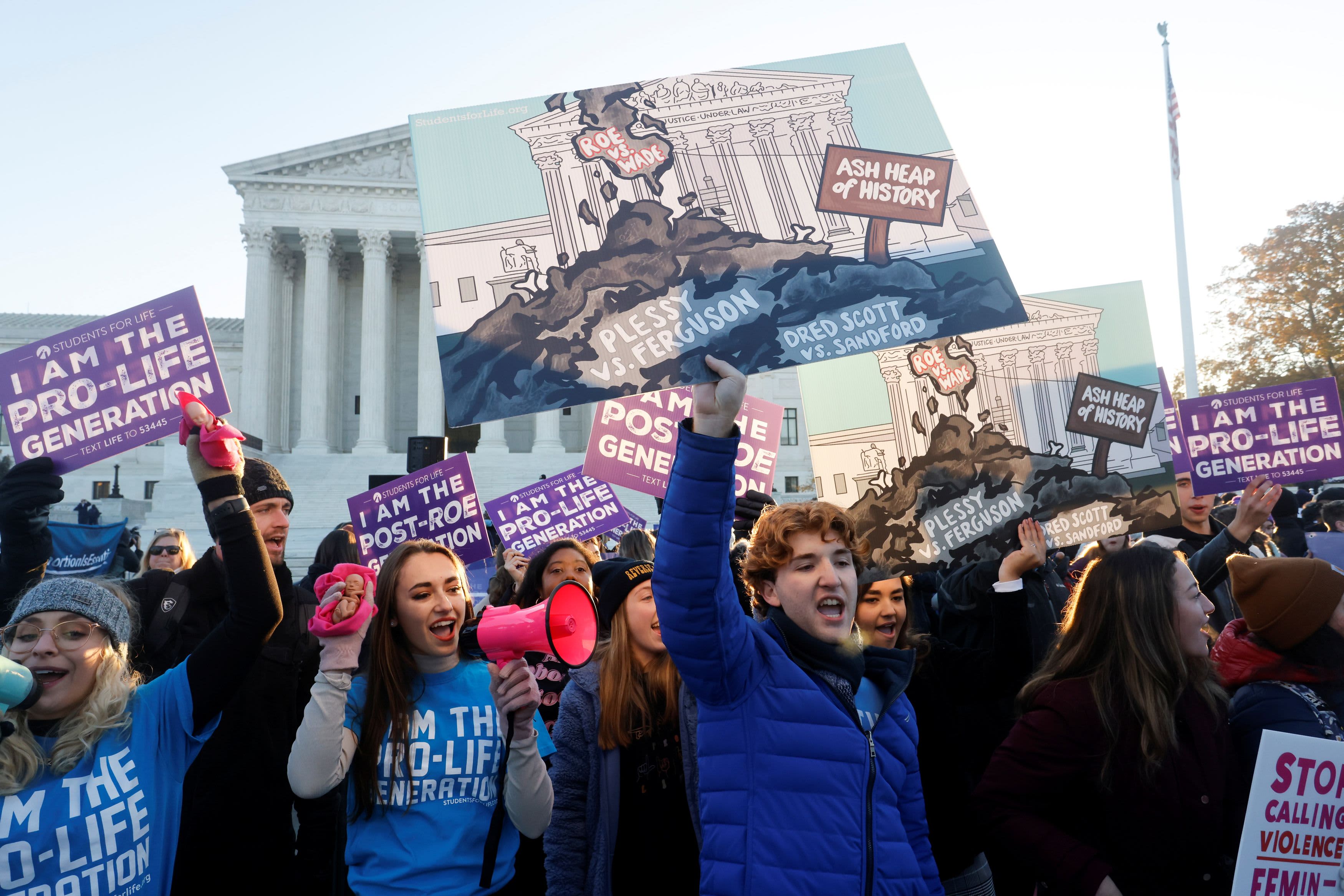Supreme Court conservatives look ready to gut Roe v. Wade during arguments in Mississippi abortion case

Pro-abortion rights activists protest outside the Supreme Court building, ahead of arguments in the Mississippi abortion rights case Dobbs v. Jackson Women’s Health, in Washington, U.S., December 1, 2021.
Jonathan Ernst | Reuters
The Supreme Court’s conservative majority on Wednesday appeared poised to side with Mississippi in its bid to uphold a 15-week abortion ban, a ruling that would erode decades-old precedent protecting the right to an abortion before viability.
The court heard oral arguments in the case, Dobbs v. Jackson Women’s Health Organization, that directly challenged the abortion rights precedent established in 1973 by Roe v. Wade and reaffirmed by 1992’s Planned Parenthood v. Casey.
The case centers on a Mississippi law that would ban almost all abortions after 15 weeks of pregnancy. Lower courts blocked the law, ruling that it violates Roe and Casey, which protects abortion before the point of fetal viability — around 24 weeks of gestation — and require that laws regulating abortion not pose an “undue burden.”
The Mississippi case marks the most significant challenge to abortion rights in decades.
Anti-abortion rights activists protest outside the Supreme Court building, ahead of arguments in the Mississippi abortion rights case Dobbs v. Jackson Women’s Health, in Washington, U.S., December 1, 2021.
Jonathan Ernst | Reuters
Justice Brett Kavanaugh, one of former President Donald Trump‘s three appointees to the court, expressed skepticism that the interests of pregnant women and fetuses can both be accommodated.
“The problem, I think the other side would say, and the reason this issue is hard, is that you can’t accommodate both interests. You have to pick. That’s the fundamental problem. And one interest has to prevail over the other at any given point in time, and that’s why this is so challenging, I think,” Kavanaugh said. “And the question then becomes, what does the Constitution say about that?”
The three liberal justices on the nine-member bench expressed fear that reversing Roe and Casey would destroy the public perception of the high court, and thus the institution itself.
“Will this institution survive the stench that this creates in the public perception that the Constitution and its reading are just political acts?” asked Sonia Sotomayor, one of three liberal justices on the nine-member bench, at the start of oral arguments in a case challenging Roe v. Wade and Planned Parenthood v. Casey.
“I don’t see how it is possible,” Sotomayor said.
Roe, Casey and other “watershed decisions” — such as Brown v. Board of Education, which ruled segregation unconstitutional — have created an “entrenched set of expectations in our society,” Sotomayor said.
“If people actually believe it’s all political, how will we survive? How will the court survive?” she asked.
Mississippi Solicitor General Scott Stewart responded that to avoid the appearance of a politicized court, the justices should reach a decision squarely grounded in the text of the Constitution.
Stewart argued that Roe and Casey “haunt our country,” and that the right to an abortion is not supported in the Constitution but in “abstract concepts” that the high court “has rejected in other contexts.”
The liberal justices Sotomayor, Elena Kagan and Stephen Breyer grilled Stewart about the justification for reversing or undermining precedent that the court has followed for three decades.
To overturn a longstanding precedent, “usually there has to be a justification, a strong justification,” Kagan said, adding that views on the Roe and Casey decisions have not significantly changed since they were made.
The 6-3 conservative majority questioned Julie Rikelman, an attorney with the Center for Reproductive Rights arguing in favor of Roe and Casey, about the precedent that protects abortion rights before fetal viability.
“Viability, it seems to me, doesn’t have anything to do with choice,” Chief Justice John Roberts said. “If it really is an issue about choice, why is 15 weeks not enough time?”
This is developing news. Please check back for updates.




